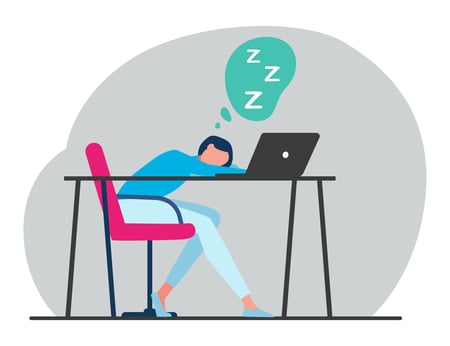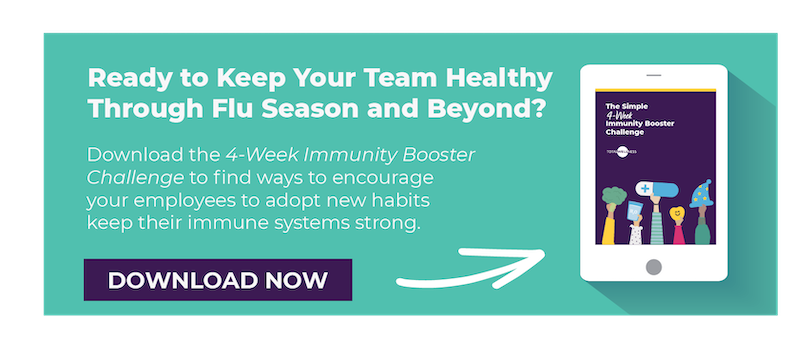 Feeling exhausted all the time? Tossing and turning all night?
Feeling exhausted all the time? Tossing and turning all night?
While those are two signs you aren’t sleeping enough, there are other ones, too: you get sick more often, new medical issues are developing, you feel irritable and moody, you can’t concentrate, and beyond.
Given that almost 40% of adults report falling asleep during the day without meaning to at least once a month, it’s a big enough issue that requires some consideration for how to change it.
If that’s you, read on to see if any of the signs match up with the symptoms you’re experiencing. Plus, you’ll find tips for ways to get better sleep so you don’t fall asleep in your next meeting.
Here’s a look at the signs that you aren’t sleeping enough on a daily basis.
Why Adults Aren’t Sleeping Well
It’s not uncommon to have a bad night of sleep every once in a while. In fact, when it does rarely happen, you can usually pinpoint a particular reason why: Work stress, relationship tensions, money issues, etc.
But what happens when it goes on and on? As in every night, is it the same experience of restless sleep? Our current technology and lifestyle choices often play a significant role. We have unfettered access to the internet, addictive video games and social media apps, and cell phone addictions — 53% of adults claim they’ve never gone longer than 24 hours without their cell phone.
Other than tech choices, here are other reasons you may be up late into the night:
- Aging
- Lifestyle choices
- Anxiety or depression
- Medication side effects
- Sleep disorder conditions
- Underlying health issues
Between 50 to 70 million Americans experience sleep-related problems, according to the American Sleep Apnea Association. At least once a month, 70 percent of Americans report sleep insufficiencies. Other than feeling tired, though, there are other tell-tale signs that your sleep cycles aren't all that great.
Related: 12 Sleep Facts That Prove Skipping Shut-Eye is a Bad Idea
Signs You Aren’t Sleeping Enough or Well Enough
Not surprisingly, sleep deficiency may interfere with work, school, driving, and social functioning.
For those who regularly have issues with getting a good night’s sleep, the next day can be a mess. Often lack of sleep causes issues with focusing and even misjudging other people’s emotions, according to a recent article from the National Heart, Lung, and Blood Institute.
Here’s a look at other signs you aren’t sleeping enough:
Your Memory is Getting Worse
One interesting aspect of poor sleep is that those who aren’t getting quality shut-eye risk forming “false memories.” This was evident in a 2016 study of both young adults and healthy adolescents. Even if you’re in bed for a full eight hours, if sleep is fragmented, it can negatively affect memory, too. Watch for when you forget things and see how it’s correlated to your sleep that night before.
You Have Excessive Daytime Sleepiness (EDS)
Two of the most common symptoms of Excessive Daytime Sleepiness include oversleeping throughout the day and nighttime restlessness. It makes it difficult to stay awake during the day and is often caused by insomnia. The disruption of normal sleep-wake cycles may also be caused by sleep apnea, narcolepsy, or other types of sleep disorders.
Your Health Issues Are Worsening or Developing
If you find you have new medical issues developing or that your current health issues are worsening, lack of quality sleep may be to blame. Too little sleep can lead to issues like diabetes and high blood pressure. For diabetics, restorative sleep can help level out blood sugar levels, but too little can worsen blood sugar issues.
You’re Experiencing More Injuries
Sleep deficiency is also attributed to a higher chance of injury in adults. Sleepiness while driving is found to be almost as dangerous as drunk driving. For older adults, lack of sleep can cause issues with balance, leading to more falls and broken bones. One 2019 study from the Journal of Science and Medicine in Sport found endurance athletes who reported less than seven hours of sleep nightly also experienced the biggest increase in injuries.
Chronic Sleep Deprivation Side Effects Are Serious
Every person requires a different amount of sleep. There are certainly guidelines, but environmental factors, behavioral conditions, and genetics also play a role in how much sleep a person needs. A minimum of seven hours is recommended by health experts.
As mentioned above, some of the more noticeable, immediate signs you aren’t sleeping can include brain fog, more injuries, and the like. Over long periods of time, sleep deprivation can cause even more significant side effects.
Here’s a look at some of the more dangerous implications:
- Reduced immune function
- Increased risk of heart attack, stroke
- Potential increase of blood pressure
- Increased risk for diabetes and depression
For those who don’t sleep well, they may notice more severe chronic health issues. Studies show that insufficient sleep can lead to weight gain and is a potential risk factor for obesity. Chronic sleep issues are also linked to long-term mood disorders such as anxiety, depression, and mental distress.
Looking at ways to improve sleep by taking signs you aren’t sleeping enough seriously can get you on the right track to a good night’s sleep sooner.
Related: 8 Experts Give Their Best Advice on How to Sleep Better at Night
How to Improve Your Sleep Quality
Sometimes the more you fight trying to fall — and stay asleep — the harder it is to actually get productive, healthy sleep. Whether you have mild sleep deficiency or you’re experiencing several nights in a row of no sleep, getting to the bottom of it can take some time.
Here are a few tips to get better sleep:
- Create a relaxing routine - Do your best to go to bed and wake up at the same time each day. This trains your body to feel relaxed and ready to go to bed when the time comes. Be consistent.
- Block out lights - An hour before bed, make it a habit to either shut off your phone or keep it in another room as you settle into bed. Any sort of blue light from screens can interrupt your body’s melatonin release. Additionally, blocking out any light from the outside with black-out curtains can ensure you feel ready for sleep when the time comes.
- Exercise regularly - Aside from exercise being good for your overall body, it’s actually helpful for your sleep schedule, too. Being physically active throughout the day can wear your body out so you feel tired enough to go to bed at night.
- Make sure you’re comfortable - If your bed is lumpy or your pillow is flat, it makes it difficult to get comfortable to rest. Consider investing in options to promote a better sleep environment that you’ll feel relaxed in. For some, that may be as simple as keeping an overhead fan on or getting cooling sheets. Consider any way you can eliminate discomfort.
- Talk to your doc - If your sleep hasn’t improved with your own adjustments and different methods of getting to bed, it may be time to talk to your doctor. They can rule out issues like acid reflux, sleep apnea, and other disorders that can cause a disturbance in your sleep routine.
Above all, listen to your body. Take time to relax and unwind before bed each evening — watching the news or checking email isn’t exactly relaxing — and see if it makes a difference in your sleep quality.
A good night’s sleep is the foundation for a good mental state and overall good health. Take the time to investigate the causes thoroughly so you can stop dragging through your days. Doing so can make all the difference when it comes to your reactions, memories, productivity, and health.
How much sleep do you get each night? Do you have a special nighttime routine that helps? Share your thoughts in the comments below!


